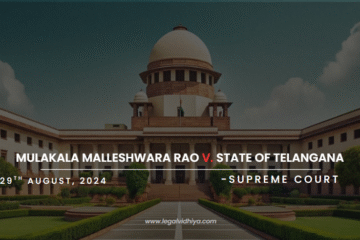
| Citation | Civil Appeal No. 3663 of 2023. |
| Date of Adjudication | May 17, 2023. |
| Court | The Honourable Supreme Court of India. |
| Case Type | Constitutional Law |
| Appellant | Indian Oil Corporation |
| Respondent | Ajit Kumar Singh |
| Bench | Justice Abhay S. Oka and Justice Rajesh Bindal |
| Referred | “Judicial Review cannot be exercised to be appreciate evidence in departmental enquiry proceedings; if criminal trial is re-examined by High Court” |
FACTS OF THE CASE
The Appellant, i.e., Indian Oil Corporation released a tender notice for the project titled ‘Restoration of Surface Drain, Tank Pad, and Tanks within the Barauni Refinery.’ Three potential contractors submitted their bids. On August 24, 2001, the technical bids were examined, but were not revealed. Instead, they were securely stored in a drawer under lock and labeled as ‘not opened today’, by one, K.C. Patel. He and the respondent, Ajit Kumar Singh, had access to the keys.
The price bids were unveiled on October 1, 2001. Each bidder’s quotation form bore the signatures of both K.C. Patel and G.S. Mahto, and the items were recorded in a register. However, while preparing the comparative table on October 3, 2001, Patel observed a modification in M/s. Laxmi Singh’s price bid where the digit ‘9’ in the figure ‘9.6’ had been crossed out and replaced with ‘5’. Notably, K.C. Patel’s signature was absent on the altered bid. Ajit Kumar Singh, the Respondent, faced allegations as this tampered bid document bore his signature. The allegation was corroborated by the inquiry report from the Central Forensic Institute. As a result, a Charge Sheet was issued against him, and the inquiry report was forwarded to the Disciplinary Authority, which imposed penalties. His appeal was also dismissed by the Appellate Authority.
Subsequently, Ajit Singh submitted a writ petition in the High Court, which was initially rejected. However, the Divisional Bench later overturned the decision made by the Single Judge Bench and revoked the punishment imposed on the Respondent. An appeal against the decision of the Divisional Bench was then filed in the Supreme Court, who adjudicated that a constitutional court should not re-evaluate evidence when conducting a judicial review.
ISSUES RAISED
In the Hon’ble Supreme Court of India, following issues were raised-
- Can the purview of judicial review be broadened to encompass the assessment of the accuracy or rationality of an administrative decision on factual grounds?
- Whether or not the appeal should be allowed?
ARGUMENTS OF THE APPELLANT
The argument presented by the appellant’s counsel asserted that, in the context of judicial review, the High Court’s authority to intervene in disciplinary proceedings is limited to assessing whether the proper procedures were adhered to during the investigation and if the employee in question was provided a fair opportunity. Detailed evidence could not be scrutinized, especially in an intra-court appeal, as the punitive sentence and the subsequent appellate ruling had previously been affirmed by the Single Bench. The evidence of price bid tampering had been conclusively proven through the report of the Central Forensic Institute. The key factor was that the altered quotation displayed the authentic signature of the Ajit Singh, suggesting his involvement, which necessitated overturning the Divisional Bench’s decision.
ARGUMENTS OF THE RESPONDENT
Conversely, the counsel for the Respondent argued that the Divisional Bench rectified the injustice faced by Ajit Kumar Singh, the Respondent, and the appellants should not have any complaints regarding that. The mere fact that the Respondent had a duplicate key to the drawer where the bid documents were stored does not render him accountable for any tampering or bid substitution. Indeed, he has been unfairly blamed by his colleagues. The Respondent has already endured over two decades of suffering in this ordeal. The order passed by the Divisional Bench is free from any mistakes and errors, and the appeal should be turned down.
ADJUDICATION BY THE HON’BLE SUPREME COURT
The bench consisting of Justice Abhay S. Oka and Justice Rajesh Bindal, while presiding over the appeal filed by the Indian Oil Corporation, overturned the High Court’s decision that had nullified the disciplinary punishment imposed on an employee during departmental proceedings, on re-evaluating the evidence during an intra-court appeal. It relied on the precedent of Deputy General Manager (Appellate Authority) v. Ajai Kumar Srivastava, where it was ruled that in a judicial review, a Constitutional Court is limited to assessing the deliberation process rather than assessing the validity and justifiability of the decision itself. This limitation is in place to secure impartiality in the procedural treatment and not in the ultimate judgement. In the case, the Supreme Court noted and maintained that during Judicial Review, it cannot approach the matter as if it were the first phase of investigation.
Furthermore, the bench in the case in question, noted that the Respondent did not dispute the fact that he was provided a fair opportunity to be heard at every phase of the investigation. Consequently, the same conclusions were reached by the bench led by a Single judge. The court in the case made an observation and highlighted that the Divisional Bench rendered its judgment as if it were the initial phase of the case, assuming as if the inquiry process was underway and the inquiry report was being compiled. This approach falls outside the purview of Judicial Review, which is why, the Constitutional Court should refrain from re-evaluating the evidence during judicial review as if it were a re-examination of a criminal trial conviction by a higher court.
As a result, the bench granted the appeal, nullifying the judgment issued by the Divisional Bench. Additionally, the bench reinstated the order given by the Single Judge Bench.
Written by Aarya Dubey an intern under legal vidhiya.




0 Comments